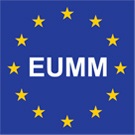When I was a kid, perhaps 8-9 years old, I had a notebook in which I wrote down all the capitals of the world. I was fascinated by the world outside of my room in Malmo, Sweden, and somehow Tbilisi really appealed to me. After completing studies in political science and an MA in Human Rights, I worked initially in Kosovo for an international NGO specialising in minority rights. Before that I worked for three years in another NGO in Geneva. It was here where I familiarised myself with the UN human rights machinery.
Keen on a new challenge, I applied for a Monitor vacancy at EU Monitoring Mission (EUMM) in Georgia. A few months later I received a phone call asking if I was still interested in the position. I most certainly was!
Since joining the Human Security Team at Field Office Mtskheta, close to Tbilisi, I have had numerous conversations with residents in settlements for Internally Displaced Persons (IDPs). As a monitoring mission, we do not provide humanitarian aid. Sometimes, I find it really challenging just to listen and report on the situation of IDPs, many of whom indeed are in dire need of support. However, the people we meet consistently reassure us of how important it is for them to share their reality with us and that the continued presence of EUMM contributes to provide a bedrock for peace and stability.
A civilian in my first EU mission, I find it exciting that we as monitors, being the only international presence on the ground does make a difference, especially for the ordinary people living close to the Administrative Boundary Line with South Ossetia. Yes, collecting information which we do, does influence EU’s policy on Georgia.
In this process, I find it particularly important to collect gender disaggregated data so that the situation for women and men, girls and boys is represented in an equal manner. It is a cliché, but nonetheless true, that one of the benefits of working in an EU mission, like the EUMM, is the strength in diversity among colleagues from civilian, military and police professions. In this vein, I cannot overemphasise how invaluable the role of the language assistant is in supporting our work. They too are an invaluable source of information on the localities, region, customs and knowledge generally.
While enjoying a somewhat rural life in Mtskheta, I frequently venture into nearby Tbilisi to partake in social activities. I cannot help but think that the boy with the notebook would be pretty pleased about where I ended up.
